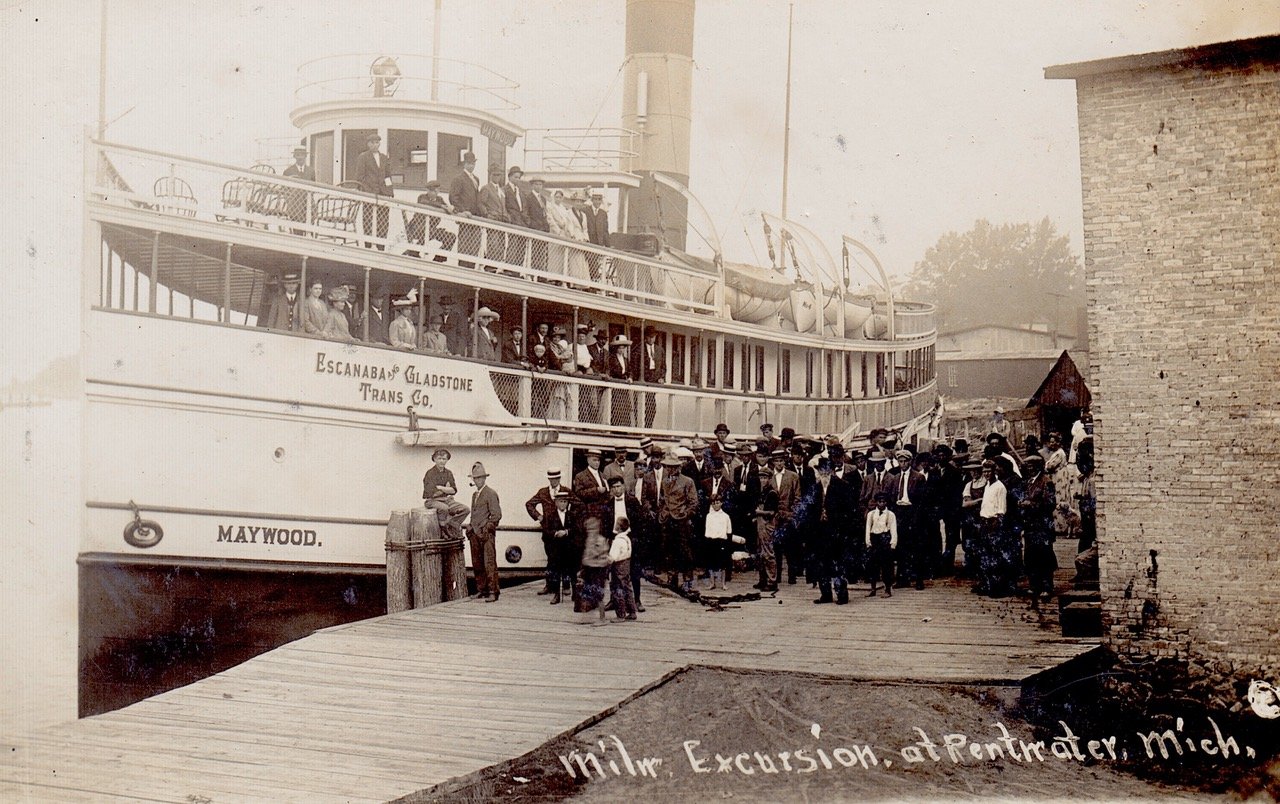The Steamship Maywood at Pentwater Harbor
Passenger and freight-carrying steamships made frequent Pentwater stops, which were crucial to the village economy. Recorded stops included the Lizzie Walsh in 1901 and the regular visits of both Kansas and Illinois steamers owned by the Northern Michigan Transit Company. These steamships made news, for example, on September 4, 1906, when the departing steamer Kansas clipped the corner of the massive Sears & Nichols Canning Factory dock. A section flew straight into the air, dumping the factory owner into the water and leaving him to swim under the warehouse and up the bank. That dock section then toppled on the badly bruised passengers, Dr. and Mrs. Harvey Wilson of Chicago. On Sunday, August 17, 1908, the Illinois, with a full passenger load, ran aground in heavy seas south of the Pentwater pier. The Illinois extracted itself and sailed on.
The Hill Company's passenger steamship Maywood docked in Pentwater in 1906. By 1911, it transitioned to freight with the encouragement of the Pentwater Boosters Club. Hill Company scheduled daily runs carrying the Oceana fruit crop to Wisconsin markets and presenting the first serious challenge to the previous monopoly held by the Pere Marquette Company, who also owned the rail lines. The Hill Company’s first fruit run was on August 12, 1911. The steamship’s arrival brought village residents out to cheer, roused by whistles and a marching band. Hill Company further challenged the Pere Marquette company by wooing both growers and buyers when they offered cross-lake excursion trips.By September 1913, Pere Marquette fought back by drastically cutting shipping rates charged to Pentwater and Ludington farmers. Manistee, Onekama, and Arcadia strongly protested when the discounted pricing excluded them. They threatened to complain to the Michigan Railroad Commission.
In answer to this, the Hill Company refused to lower their prices to the Pere Marquette rates but fought back by offering Manistee fruit farmers a long-requested direct run to Milwaukee via the fastest boat on the lake, the steamer Mackinaw. Hill Company published editorials in Wisconsin newspapers calling for support of its efforts to move the fruit crop between Wisconsin and West Michigan. They further offered a fast daily passenger steamer between Pentwater and Manistee. The price war continued! When the Pere Marquette line felt secure in the continued business of fruit growers, they caught them off guard by following the discounted rates with a cut in the number of cross-lake freight runs. In August 1914, newspaper accounts reported that the Hill Company again offered daily fruit deliveries to Wisconsin markets. In 1915, the Hill Company bought the formerly-leased Maywood and the federal government broke the Pere Marquette Company’s freight transportation monopoly when it implemented provisions of the 1912 Panama Canal Act, which prohibited railroad companies from owning steamships.
By 1917, World War I interrupted, and the French Navy bought the Maywood Steamship for the war effort, renaming it the Inca. Steamship days have passed, but Lake Michigan remains integral to Pentwater's tourist economy.
